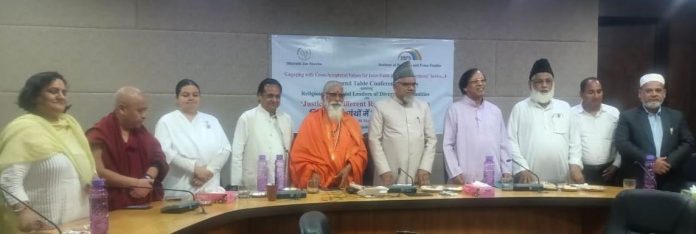New Delhi, May 31, 2024: The Dharmik Jan Morcha and the Institute of Harmony and Peace Studies (IHPS) jointly organized a Round Table Conference on Thursday at the Jamat-e-Islami Hind (JIH) Headquarters. The conference, titled “Justice in Different Scriptures,” brought together religious and social leaders from diverse communities to explore the concept of justice in various religious texts and to discuss how these principles can be upheld in society.
Prof. Mohammad Salim Engineer, Vice-President of Jamat-e-Islami Hind and National Coordinator of Dharmik Jan Morcha, chaired the event. In his opening address, Engineer Salim emphasized the fundamental role of equality in justice, as highlighted in the Quran and other religious texts. He stressed the importance of standing against injustice, regardless of the perpetrator’s identity, to maintain the integrity of justice.
Dr. M. D. Thomas, Founder Director of IHPS, discussed the alignment of the secular and democratic principles of the Indian Constitution with the sacred values of various religions. He noted that Christianity, like other faiths, upholds a uniform concept of justice.
Goswami Shushilji Maharaj, founder of the Bhartiya Sarva Dharma Sansad, reiterated that all religions advocate for peace and justice. He proposed that religious leaders develop a common agenda to promote these values in society and suggested forming a panchayat to address and monitor instances of violence and injustice.
JIH National Secretary Mohammed Ahmed highlighted the constitutional principle of secularism, underscoring the state’s role in protecting religious freedom. He pointed out the rising trend of targeting and demonizing individuals from specific religious communities, calling for closer social integration and rapport among citizens.
Dr. Syed Ahmad Iqbal, Chancellor of Halima Aziz University and Goodwill Ambassador of the Indo-Arab Society, quoted the Quran, emphasizing the sanctity of human life and the gravity of unjustly taking an innocent life.
Representatives from various religious communities, including Brahma Kumari Hussain, Ajay Jain from the Jain community, Yash Pal from the Sikh community, and Acharya Yeshi Phuntsok from the Buddhist community, also shared their perspectives. They discussed the practical applications of justice as taught in their respective scriptures.
The conference concluded with a collective commitment from the leaders to work together towards fostering peace and justice, advocating for the implementation of these timeless values in contemporary society.




